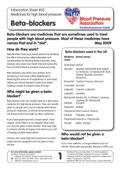Beta-blockers are a type of medicine which are sometimes used to treat high blood pressure.
There are different types of beta-blocker used to treat different problems. They’re often used to treat heart problems such as angina (chest pain), an irregular heartbeat (including atrial fibrillation), heart failure, and heart attacks.
They can help with high blood pressure by slowing down the rate and force of the heartbeat. Most have names that end in ‘olol’, such as atenolol, bisoprolol and labetalol.
How do beta-blockers work?
Beta-blockers block the release of the hormones adrenaline and noradrenaline. Their full name is beta-adrenoceptor blocking agents.
Adrenaline and noradrenaline are part of the flight or fight response. They make the heart beat faster and with more force, raising your blood pressure. Beta-blockers allow the heart to beat more slowly and less forcefully.
Beta-blockers also block the production of angiotensin II, a hormone which makes the blood vessels contract, making them narrower. Beta-blockers allow your blood vessels to relax and widen, making it easier for blood to flow through, lowering your blood pressure.
Who can take beta-blockers?
If you have high blood pressure, your doctor or nurse might suggest you take medicines to lower it. It can take some trial and error to find the right one or the right combination.
Beta-blockers are usually used if other drugs are not working well or are not suitable for you. For example, if you have side effects, have other health problems or are taking certain medications. They can also be used alongside other blood pressure medications.
They’re not usually one of the first one’s you’ll try because other medicines appear to be better at lowering your risk of stroke and heart disease.
Beta-blockers can be a good option if you have other heart problems. They may help to prevent attacks of angina, if you have had a heart attack they can lower your risk of having a further heart attack, and they can be used to treat heart failure or an irregular heartbeat.
Beta-blockers can be suitable if you are pregnant or planning to become pregnant, and can be a good option in younger people.
When are beta-blockers not suitable?
Beta-blockers might not be suitable for you, or you might need closer monitoring, if you have other health problems or are taking certain medications. For example, if you have problems that affect your breathing such as asthma or chronic obstructive pulmonary disease (COPD) – as beta-blockers can narrow your airways and could trigger or worsen an asthma attack, or if you have certain heart problems including heart block, unstable heart failure, or a low heart rate.
Your doctor will consider your overall health and any treatments you are having before giving you any new medicines.
Do beta-blockers have side effects?
All medicines can have side effects, including blood pressure medicines. It’s likely you won’t have any side effects at all with beta-blockers, or you might have some that are minor and don’t cause you too many problems.
If you have side effects which don’t improve and are affecting your day-to-day life, you should be able to try a lower dose or a different medicine.
The possible side effects of beta-blockers include:
- feeling dizzy or faint
- a sudden drop in blood pressure when you go from lying or sitting down to standing up (postural hypotension)
- tiredness
- cold hands and feet
- slow heart rate
- headaches
- diarrhoea and feeling sick
- blurred vision
- sleep problems
- loss of libido or sex drive, and erectile dysfunction
- depression
Beta-blockers can make breathing problems worse, for example if you have asthma or heart failure. If your breathing is affected, contact your doctor immediately.
The leaflet that comes with your medicine will have a full list of possible side effects.
Taking beta-blockers
You take beta-blockers as tablets, usually once a day.
If you feel dizzy or your vision is affected, it won’t be safe to drive or operate machinery. Speak to your doctor about what’s safe for you, and you may need to speak to your employer.
If you are taking a beta-blocker with another type of blood pressure medicine, called a thiazide diuretic, you could have a higher risk of developing diabetes in the long term. If you already have diabetes, beta-blockers can mask the warning signs of a hypo (hypoglycaemia), such as fast heart rate, so you will need careful monitoring.
Check with your doctor or pharmacist before taking any other medicines at the same time as beta-blockers, as they can interact, including medicines you buy over the counter such as painkillers and anti-inflammatories.
If you start taking high blood pressure medicines, it’s likely you will need to keep taking them for the long term. If your blood pressure stays under control for several years, you might be able to take a lower dose or stop taking them altogether.
It’s important that you don’t simply stop taking beta blockers because your blood pressure will quickly rise again and you might have other problems including rapid, irregular or forceful heart beats (palpitations), and your angina could come back. Speak to your doctor, nurse or pharmacist if you’re struggling because there could be other options you can try. If you need to change to a different medicine, your doctor will probably lower the dose gradually.
If you are taking a beta-blocker you should avoid alcohol, as it can lower your blood pressure further. If you need to have surgery that involves an anaesthetic, you may need to stop taking the beta-blockers as anaesthetics can also make your blood pressure drop too low.
Read more
Beta-blockers information sheet
 Download our Beta blockers information sheet [PDF 14,180KB].
Download our Beta blockers information sheet [PDF 14,180KB].

